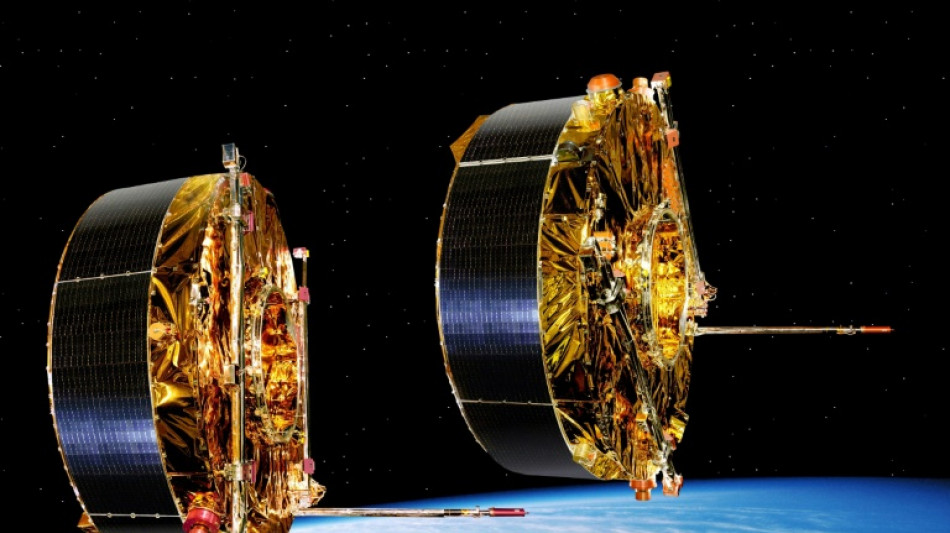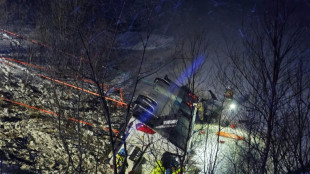
-
 Three dead, four injured in Norway bus accident
Three dead, four injured in Norway bus accident
-
Russia missile suspected in Azerbaijani plane crash, Moscow warns against 'hypotheses'

-
 Man Utd fall to Wolves as Fernandes sees red
Man Utd fall to Wolves as Fernandes sees red
-
Fernandes sent off as Man Utd crash at Wolves, troubled Man City held by Everton

-
 'Logical' that fatigued Spurs are faltering - Postecoglou
'Logical' that fatigued Spurs are faltering - Postecoglou
-
Manmohan Singh: technocrat who became India's accidental PM

-
 Panama president rules out talks with Trump over canal threat
Panama president rules out talks with Trump over canal threat
-
India's former PM Manmohan Singh dies aged 92

-
 Acid risk contained in deadly Brazil bridge collapse
Acid risk contained in deadly Brazil bridge collapse
-
Azerbaijan believes missile downed plane, Russia warns against 'hypotheses'

-
 Chelsea stunned by Fulham in blow to Premier League title hopes
Chelsea stunned by Fulham in blow to Premier League title hopes
-
Finns probe ship from Russia for 'sabotage' of cables

-
 Troubled Man City held by lowly Everton, Chelsea title bid rocked
Troubled Man City held by lowly Everton, Chelsea title bid rocked
-
Paterson, Bosch give South Africa edge over Pakistan in first Test

-
 Oil leak in Peru tourist zone triggers 'environmental emergency'
Oil leak in Peru tourist zone triggers 'environmental emergency'
-
Mozambique post-election violence kills 125 in three days: NGO

-
 Finns probing ship from Russia for 'sabotage' of cables
Finns probing ship from Russia for 'sabotage' of cables
-
Williams hits unbeaten 145 as Zimbabwe make Afghanistan toil

-
 Bowlers bring Pakistan back into first Test in South Africa
Bowlers bring Pakistan back into first Test in South Africa
-
Banbridge foils French to land King George VI Chase for Ireland

-
 Man City pay penalty for Haaland miss in Everton draw
Man City pay penalty for Haaland miss in Everton draw
-
Paterson takes five wickets as Pakistan bowled out for 211

-
 India's Kohli fined for Konstas shoulder bump during fourth Test
India's Kohli fined for Konstas shoulder bump during fourth Test
-
Kremlin cautions on 'hypotheses' over plane crash

-
 Pakistan military convicts 60 more civilians of pro-Khan unrest
Pakistan military convicts 60 more civilians of pro-Khan unrest
-
Turkey lowers interest rate to 47.5 percent

-
 Syria authorities launch operation in Assad stronghold
Syria authorities launch operation in Assad stronghold
-
Record number of migrants lost at sea bound for Spain in 2024: NGO

-
 Kohli called out over shoulder bump with Konstas during fourth Test
Kohli called out over shoulder bump with Konstas during fourth Test
-
Rural communities urged to flee east Australia bushfire

-
 Sri Lanka train memorial honours tsunami tragedy
Sri Lanka train memorial honours tsunami tragedy
-
Australia's top order fires to take charge of 4th Test against India

-
 S. Korea's opposition moves to impeach acting president
S. Korea's opposition moves to impeach acting president
-
'We couldn't find their bodies': Indonesian tsunami survivors mourn the dead

-
 Azerbaijan mourns 38 killed in plane crash in Kazakhstan
Azerbaijan mourns 38 killed in plane crash in Kazakhstan
-
Konstas and Khawaja put Australia on top in 4th Test against India

-
 Lakers pip Warriors after another LeBron-Curry classic
Lakers pip Warriors after another LeBron-Curry classic
-
India readies for 400 million pilgrims at mammoth festival

-
 Nepal hosts hot air balloon festival
Nepal hosts hot air balloon festival
-
Asia stocks up as 'Santa Rally' persists

-
 Tears, prayers as Asia mourns tsunami dead 20 years on
Tears, prayers as Asia mourns tsunami dead 20 years on
-
Sydney-Hobart yacht crews set off on gale-threatened race

-
 Key public service makes quiet return in Gaza
Key public service makes quiet return in Gaza
-
Fearless Konstas slams 60 as Australia take upper hand against India

-
 Bridges outduels Wembanyama, Celtics lose again
Bridges outduels Wembanyama, Celtics lose again
-
Hungry Sabalenka ready for more Slam success

-
 Breaking Update - BOI Reporting is Back: New Filing Deadline Set for January 13, 2025
Breaking Update - BOI Reporting is Back: New Filing Deadline Set for January 13, 2025
-
Cosmos Health Strengthens R&D Leadership and Innovation with the Appointment of Professor Dimitrios Trafalis, MD, as Head of Oncology

-
 Greenlite Ventures Expands Footprint to Four Blockchains Powered by NoLimitCoin
Greenlite Ventures Expands Footprint to Four Blockchains Powered by NoLimitCoin
-
Ryde Marks a Transformative Milestone in Singapore's Mobility Landscape

| RIO | -0.11% | 59.135 | $ | |
| CMSC | -0.49% | 23.655 | $ | |
| RBGPF | -1.17% | 59.8 | $ | |
| BTI | 0.55% | 36.46 | $ | |
| SCS | 1.1% | 11.86 | $ | |
| RYCEF | 0% | 7.25 | $ | |
| NGG | -0.05% | 58.83 | $ | |
| RELX | -0.02% | 45.88 | $ | |
| BP | 0.11% | 28.823 | $ | |
| BCE | -0.33% | 22.825 | $ | |
| VOD | -0.06% | 8.425 | $ | |
| CMSD | -0.81% | 23.46 | $ | |
| BCC | -0.21% | 122.936 | $ | |
| AZN | 0.33% | 66.52 | $ | |
| JRI | 0.16% | 12.17 | $ | |
| GSK | 0.04% | 34.045 | $ |

Old satellite to burn up over Pacific in 'targeted' re-entry first
After 24 years diligently studying Earth's magnetic field, a satellite will mostly burn up over the Pacific Ocean on Sunday during a "targeted" re-entry into the atmosphere, in a first for the European Space Agency as it seeks to reduce space debris.
Since launching in 2000, the Salsa satellite has helped shed light on the magnetosphere, the powerful magnetic shield that protects Earth from solar winds -- and without which the planet would be uninhabitable.
According to the ESA, Salsa's return home will mark the first-ever "targeted" re-entry for a satellite, which means it will fall back to Earth at a specific time and place but will not be controlled as it re-enters the atmosphere.
Teams on the ground have already performed a series of manoeuvres with the 550-kilogram (1,200-pound) satellite to ensure it burns up over a remote and uninhabited region of the South Pacific, off the coast of Chile.
This unique re-entry is possible because of Salsa's unusual oval-shaped orbit. During its swing around the planet, which takes two and half days, the satellite strays as far as 130,000 kilometres (80,000 miles), and comes as close as just a few hundred kilometres.
Bruno Sousa, head of the ESA's inner solar system missions operations unit, said it had been crucial that Salsa came within roughly 110 kilometres during its last two orbits.
"Then immediately on the next orbit, it would come down at 80 kilometres, which is the region in space already within the atmosphere, where we have the highest chance (for it) to be fully captured and burned," he told a press conference.
When a satellite starts entering the atmosphere at around 100 kilometres above sea level, intense friction with atmospheric particles -- and the heat this causes -- starts making them disintegrate.
But some fragments can still make it back down to Earth.
- Fear of 'cascading' space junk -
The ESA is hoping to pinpoint where Salsa, roughly the size of a small car, re-enters the atmosphere to within a few hundred metres.
Because the satellite is so old, it does not have fancy new tech -- like a recording device -- making tracking this part tricky.
A plane will be flying at an altitude of 10 kilometres to watch the satellite burn up -- and track its falling debris, which is expected to be just 10 percent of its original mass.
Salsa is just one of four satellites that make up the ESA's Cluster mission, which is coming to an end. The other three are scheduled for a similar fate in 2025 and 2026.
The ESA hopes to learn from these re-entries which type of materials do not burn up in the atmosphere, so that "in the future we can build satellites that can be totally evaporated by this process," Sousa said.
Scientists have been sounding the alarm about space junk, which is the debris left by the enormous number of dead satellites and other missions that continue orbiting our planet.
Last year the ESA signed a "zero debris" charter for its missions from 2030.
There are two main risks from space junk, according to the ESA's space debris system engineer Benjamin Bastida Virgili.
"One is that in orbit, you have the risk that your operational satellite collides with a piece of space debris, and that creates a cascading effect and generates more debris, which would then put in risk other missions," he said.
The second comes when the old debris re-enters the atmosphere, which happens almost daily as dead satellite fragments or rocket parts fall back to Earth.
Designing satellites that completely burn up in the atmosphere will mean there is "no risk for the population," Bastida Virgili emphasised.
But there is little cause for alarm. According to the ESA, the chance of a piece of space debris injuring someone on the ground is less than one in a hundred billion.
This is 65,000 times lower than the odds of being struck by lightning.
P.Costa--AMWN
